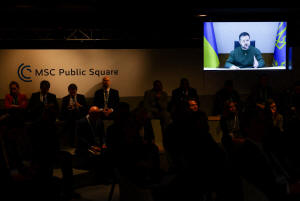Large U.S. delegation at Munich conference underscores bipartisan
support for Ukraine
 Send a link to a friend
Send a link to a friend
 [February 18, 2023]
By Jonathan Landay and Andreas Rinke [February 18, 2023]
By Jonathan Landay and Andreas Rinke
MUNICH, Germany (Reuters) - Nearly 50 lawmakers from both major U.S.
political parties on Friday attended the start of Europe's premier
annual security conference to affirm bipartisan support for U.S. aid to
Ukraine.
Four delegations of Democratic and Republican leaders and members of the
Senate and House converged as one of the largest groups of U.S.
lawmakers to attend the Munich Security Conference since its inception
in 1963, U.S. officials said.
Hundreds of politicians, military officers and diplomats from around the
world gathered in Munich a week before the anniversary of Russia's
invasion, with Ukraine's President Volodymyr Zelenskiy urging allies to
speed up weapons deliveries.
The war has tested not only the unity of the NATO alliance and European
Union, but the ability of the U.S. parties to overcome deep policy
differences.

"We are here to send a clear message to this conference and everyone
around the world: the U.S. is on a bipartisan basis totally behind the
effort of help Ukraine," Mitch McConnell, the Democratic-controlled
Senate's Republican minority leader, told Reuters after meeting
conservative German politicians.
Bavarian Prime Minister Markus Soeder said McConnell's unequivocal
support for Ukraine was welcome after the uncertainty of the former
President Donald Trump administration's isolationist America First
policy.
"Today is a very good signal," he said.
Other prominent U.S. lawmakers in Munich included Democratic Senate
Majority Leader Chuck Schumer, former House speaker Nancy Pelosi, the
Republican chairmen of the House foreign relations and intelligence
committees and their Democratic Senate counterparts.
[to top of second column]
|

Ukrainian President Volodymyr Zelenskiy
appears on the screen during the Munich Security Conference, in
Munich, Germany February 17, 2023. REUTERS/Kai Pfaffenbach

The Republican takeover of the House of Representatives in last
year's mid-terms raised questions about the future of the U.S. aid
on which Kyiv depends to halt a new offensive by Russia in a war
that has killed thousands and displaced millions.
Speaker of the House Kevin McCarthy declared there would be no
"blank check" for Ukraine and far-right Republicans hold that
resources are needed to address other pressing problems.
Some senators share that view. On Thursday, Republican Senator Josh
Hawley had urged an end to U.S. military aid to Ukraine until the
European allies increased their backing, saying sending arms to Kyiv
was threatening the United States' ability to deter a Chinese
invasion of Taiwan.
But Lindsey Graham, a leading advocate of aiding Ukraine, said in
Munich that China would be encouraged to invade Taiwan if the United
States and its European allies failed to back Ukraine.
"If you care about China and you don't get the connection between
Russia, Ukraine and China, you are missing a lot," Graham told
Reuters.
But Republicans and some Democrats also say President Joe Biden's
administration should better explain its Ukraine policy.
The United States is Ukraine's leading military aid supplier at some
$30 billion, including long-range artillery, air defence systems and
advanced armored vehicles.
There are now calls on both sides of the Atlantic for Ukraine to
receive advanced Western fighter jets.
(Reporting by Jonathan Landay and Andreas Rinke; editing by Matthias
Williams and Angus MacSwan)
[© 2023 Thomson Reuters. All rights
reserved.]This material may not be published,
broadcast, rewritten or redistributed.
Thompson Reuters is solely responsible for this content. |